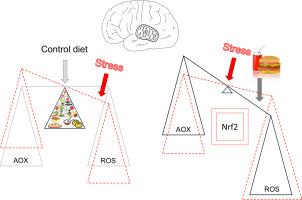当前位置:
X-MOL 学术
›
Nutr. Res.
›
论文详情
Our official English website, www.x-mol.net, welcomes your feedback! (Note: you will need to create a separate account there.)
Acute emotional stress and high fat/high fructose diet modulate brain oxidative damage through NrF2 and uric acid, in rats
Nutrition Research ( IF 4.5 ) Pub Date : 2020-07-01 , DOI: 10.1016/j.nutres.2020.05.009 C Batandier 1 , T Poyot 2 , N Marissal-Arvy 3 , K Couturier 1 , F Canini 4 , A M Roussel 1 , I Hininger-Favier 1
Nutrition Research ( IF 4.5 ) Pub Date : 2020-07-01 , DOI: 10.1016/j.nutres.2020.05.009 C Batandier 1 , T Poyot 2 , N Marissal-Arvy 3 , K Couturier 1 , F Canini 4 , A M Roussel 1 , I Hininger-Favier 1
Affiliation

|
Studies focusing on the interaction of dietary and acute emotional stress on oxidative stress in cortex frontal and in brain mitochondria are scarce. Dietary-induced insulin resistance, as observed in Western diets, has been associated with increased oxidative stress causing mitochondrial dysfunction. We hypothesized that acute emotional stress could be an aggravating factor by impacting redox status in cortex and brain mitochondria. Thus, the aim of the present study was to evaluate the combination of an insulin resistance inducing high-fat/high-fructose (HF/HFr) diet and acute emotional stress on brain oxidative stress in rats. We measured several oxidative stress parameters (carbonyls, FRAP, TBARS assays, GSH, GSSG, oxidized DNA, mRNA expression of redox proteins (Nrf2), and uric acid). The HF/HFr diet resulted in increased oxidative stress both in the brain mitochondria and in the frontal cortex and decreased expression of the Nrf2 gene. The emotional stress induced an oxidative response in plasma and in brain mitochondria of the control group. In the HF/HFr group it triggered an increase expression of the redox transcription factor Nrf2 and its downstream antioxidant genes. This suggests an improvement of the redox stress tolerance in response to an enhanced production of reactive oxygen species. Accordingly, a blunted oxidative effect on several markers was observed in plasma and brain of HF/HFr-stressed group. This was confirmed in a parallel study using lipopolysaccharide as a stress model. Beside the Nrf2 increase, the stress induced a stronger UA release in HF/HFr which could take a part in the redox stress.
中文翻译:

急性情绪压力和高脂肪/高果糖饮食通过 NrF2 和尿酸调节大鼠脑氧化损伤
关注饮食和急性情绪压力对皮质额叶和脑线粒体氧化应激的相互作用的研究很少。正如在西方饮食中所观察到的,饮食诱导的胰岛素抵抗与导致线粒体功能障碍的氧化应激增加有关。我们假设急性情绪压力可能通过影响皮层和脑线粒体中的氧化还原状态而成为加重因素。因此,本研究的目的是评估胰岛素抵抗诱导的高脂肪/高果糖 (HF/HFr) 饮食和急性情绪压力对大鼠脑氧化应激的影响。我们测量了几个氧化应激参数(羰基、FRAP、TBARS 分析、GSH、GSSG、氧化的 DNA、氧化还原蛋白 (Nrf2) 的 mRNA 表达和尿酸)。HF/HFr 饮食导致大脑线粒体和额叶皮层的氧化应激增加,并降低 Nrf2 基因的表达。情绪压力在对照组的血浆和脑线粒体中引起氧化反应。在 HF/HFr 组中,它触发了氧化还原转录因子 Nrf2 及其下游抗氧化基因的表达增加。这表明响应于活性氧物质的增加产生的氧化还原应力耐受性的改善。因此,在 HF/HFr 应激组的血浆和脑中观察到对几个标志物的钝化氧化作用。这在使用脂多糖作为压力模型的平行研究中得到证实。除了 Nrf2 增加外,应力还导致 HF/HFr 中更强的 UA 释放,这可能参与氧化还原应力。
更新日期:2020-07-01
中文翻译:

急性情绪压力和高脂肪/高果糖饮食通过 NrF2 和尿酸调节大鼠脑氧化损伤
关注饮食和急性情绪压力对皮质额叶和脑线粒体氧化应激的相互作用的研究很少。正如在西方饮食中所观察到的,饮食诱导的胰岛素抵抗与导致线粒体功能障碍的氧化应激增加有关。我们假设急性情绪压力可能通过影响皮层和脑线粒体中的氧化还原状态而成为加重因素。因此,本研究的目的是评估胰岛素抵抗诱导的高脂肪/高果糖 (HF/HFr) 饮食和急性情绪压力对大鼠脑氧化应激的影响。我们测量了几个氧化应激参数(羰基、FRAP、TBARS 分析、GSH、GSSG、氧化的 DNA、氧化还原蛋白 (Nrf2) 的 mRNA 表达和尿酸)。HF/HFr 饮食导致大脑线粒体和额叶皮层的氧化应激增加,并降低 Nrf2 基因的表达。情绪压力在对照组的血浆和脑线粒体中引起氧化反应。在 HF/HFr 组中,它触发了氧化还原转录因子 Nrf2 及其下游抗氧化基因的表达增加。这表明响应于活性氧物质的增加产生的氧化还原应力耐受性的改善。因此,在 HF/HFr 应激组的血浆和脑中观察到对几个标志物的钝化氧化作用。这在使用脂多糖作为压力模型的平行研究中得到证实。除了 Nrf2 增加外,应力还导致 HF/HFr 中更强的 UA 释放,这可能参与氧化还原应力。



























 京公网安备 11010802027423号
京公网安备 11010802027423号